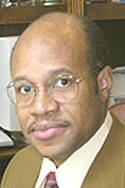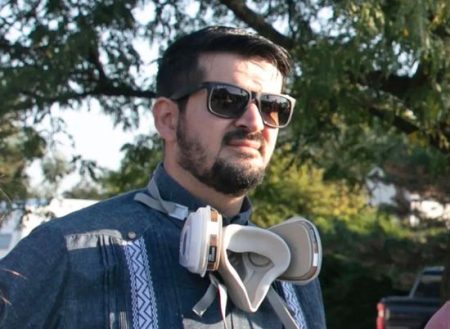Three More Failures
 |
| Dr. Errington Thompson |
As the Democratic and Republican conventions follow the Beijing Olympics and the November election draws ever closer, Americans are wrestling with a question. How did we end up here?
by Errington C. Thompson, MD
It seems that just yesterday we elected someone who was supposed to be a “compassionate conservative,” someone who was supposed to keep us safe. Instead, three recent events have highlighted that we are not any safer, and compassion has turned into a unitary executive bent on tearing up our constitution right before our eyes.
The “worst of the worst”…
Many of us did not follow the details in the trial of Salim Hamdan, Osama bin
Laden’s driver. We captured him in November 2001, and he’s been kept in
Guantánamo Bay for at least five years. The Bush Administration has
told us over and over that Guantánamo Bay was reserved the (worst of
the worst), so one would assume that Bin Laden’s driver was close to
and had sworn allegiance to the master terrorist.
We were told he was in Bin Laden’s inner circle and had working knowledge of
the terrorist’s network. In the Administration’s reckoning, these
people were so dangerous that the US court system, which has been in
place since 1789, and the military justice system, which worked for
Nazis, spies, deserters and various evildoers, could not possibly try
these men. And since they could never be set free, a separate,
extra-judicial system was set up specifically for these terrorists to
ensure that they’d never again pose a danger to our nation.
The Administration handpicked Salim Hamdan as its best case and pushed for
the death penalty or, at least, life in prison. After years of delays
and hearings in civilian courts and ruloings from the Supreme Court, he
defendant finally went on trial this summer, before a military tribunal
made up of six military officers and a military judge.
Extra constitutional rules were set up to ensure convictions of “the worst of the worst:”
coercive testimony was admissible; secret documents could be submitted;
the defense was denied access to documents and other evidence.
… or maybe not
And, after all of this, Salim Hamdan was found guilty of being bin Laden’s
driver, something he never denied. He was sentenced to 5-1/2 years in
prison, with at least five years credited for time served. He is due to
be released by the end of the year — though even now the Administration
“has not determined” whether he’ll be released after serving his full
sentence.
Even in these sham courts the Bush Administration was unable to get the results
it wanted. They shredded the Constitution, denied fundamental rights
like habeas corpus, and ignored international law. Why? To convict
Salim Hamdan of being Osama bin Laden’s driver, a fact he had freely
admitted long ago. A first-year law student could have won that case.
Anthrax witch hunt
Now let’s look at this anthrax case. The fall of 2001 was terrible for most
Americans. Shortly after the twin towers fell, anthrax began showing up
in mailboxes up and down the East Coast. Senators Tom Daschle and
Patrick Leahy and media outlets including American Media Inc. and NBC
were sent anthrax through the mail. Offices were contaminated, many
people were sickened, and five died. Was this a second Al Qaeda attack?
Could this be the work of a foreign government taking advantage of our
weakened state? There were many theories, but no one truly had the
answers.
A few things were clear from the start. First, what was used was not your
garden-variety anthrax, but a highly refined, very dangerous powder
form. The process of taking bacteria from a petri dish and creating an
environment that turns the bacteria into a powder without killing the
bacteria is amazingly complex and difficult.
Therefore, the FBI knew that whoever was behind this had to be an expert in
bioterrorism. Furthermore, whoever was behind these attacks must have
had access to an original stock, highly sophisticated equipment, and
the knowledge and ability to select out a very aggressive form of
anthrax and to create a crystalline, powdered form.
Whoops! One suspect down…
The FBI and the Bush Administration have had almost seven years to figure
out this mystery. For the first four years, the major suspect was Dr.
Steven Hatfill, until sometime in 2005 it became clear that he was not
the perpetrator. Hatfill was found to have padded his resume, but that
was his only crime.
Having publicly named him as a prime suspect, investigated him for more than
four years, and destroyed his reputation, the Administration blithely
announced that he was innocent. Dr. Hatfill had to sue to try to repair
his damaged reputation, and our government paid him $5.8 million to
settle the case.
The attention of the FBI then turned to a quirky scientist named Bruce
Ivins, who died in July at age 62, an apparent suicide, before the
government could file charges. The FBI called a news conference and
laid out the majority of their evidence to support their suspicion that
Dr. Ivins was indeed the guilty man. Not only was he guilty, according
to the FBI, but he acted alone.
I don’t know about you, but I’m skeptical. First of all, the vast amount of
information that was needed to pull this off — could it be contained in
one man’s head? It is possible, but doubtful. Then to have the
engineering knowledge to obtain and use the equipment to refine the
anthrax, again, that’s hard to fathom. The FBI never proved that Mr.
Ivins had access to the equipment that could turn the anthrax to a
viable powder. Finally, there doesn’t seem to be any motive. It is
clear that this guy was weird but was he a killer? It seems to me that
there are several large gaps in the FBI’s evidence and it also seems to
be awfully convenient that the chief suspect is now dead and can’t
speak for himself.
Another sham?
After seven years and spending millions of dollars, I don’t think that we are
any closer explaining how someone (or some folk) pulled off the anthrax
scare. This has to be written down as another failure of the Bush
Administration. Remember, counterterrorism was supposed to be a
slam-dunk for the Republicans. Yet, in two of the most high profile
terrorism cases in a decade, we seem to have come up empty.
Then, just as the Olympics got under way in Beijing, Russia invaded its
neighbor Georgia, formerly part of the Soviet Union. Georgia had also
recently started an offensive into two of its own breakaway provinces,
South Ossetia and Abkhazia, bot of which have long been ethnically and
culturally closer to Russia than Georgia.
Baiting the bear
If you’re a scholar of Russian history like Secretary of State Condoleezza
Rice then you would have been extremely aware of these complex
relationships. It is clear that over the last 20 years, Russia has used
Ossetia and Abkhazia to try to influence Georgia, and the US has pushed
Georgia to separate even more from Russia, even offering it membership
in NATO.
Yet when Georgia invaded South Ossetia, and Russia, in response, unleashed a
massive offensive against Georgia, the United States was caught off
guard. Now, in this post-9/11 world, how can we be caught off guard? We
monitor a huge amount of communications, don’t we? We have multiple
satellites observing the world, including Russia. Didn’t we see Russian
tanks and troops moving towards the Georgian border?
Most importantly, what part did we play in encouraging the initial
aggressive acts of Georgia? The Georgians know that these two provinces
are extremely important to Russia, and they and we should also know
that Russians have been settling in these regions as a way to influence
local politics.
So why would Georgia assume that if they launched an offensive, Russia would
sit by and watch it happen? Although I have not read any reports that
suggested Georgian leaders spoke to the State Department or the White
House prior to their crackdown in Ossetia or Abkhazia, I find it hard
to believe that Georgia would unilaterally advance against these areas.
But with the majority of our armed forces tied down in Afghanistan and Iraq, we
could offer no military assistance. Nor could we ask our allies to step
up and help us after alienating some and overextending others in our
two wars. As a result, the world’s last superpower was forced to depend
on the European Union’s current president, Sarkozy of France, to
negotiate a cease-fire. (This, just five years after we snubbed the
entire French nation and alienated its people with “freedom fries” and
similar juvenile rudeness.)
All bite, no bark
Now, having spent years assuring the Georgians that “we’ve got your back,”
when push came to shove, we let them be stabbed in the back. That’s
hardly an endorsement of American power and responsibility, nor can it
by any stretch be considered a foreign-policy victory. Even John
McCain’s claim that “today, we are all Georgians,” turned out to be
just empty rhetoric — at most, a sound bite that lasted a few hours. In
spite of the fact that, as I write this, the Russians are pulling out
of Georgia, they retain the upper hand, and we’re left with yet another
Administration blunder.
In this new post-9/11 world, we must learn to anticipate, adapt, and overcome;
we must learn to do everything – globally and domestically – better and
smarter. Unfortunately, the Bush Administration doesn’t seem to be
doing anything better, and nothing even remotely smart








